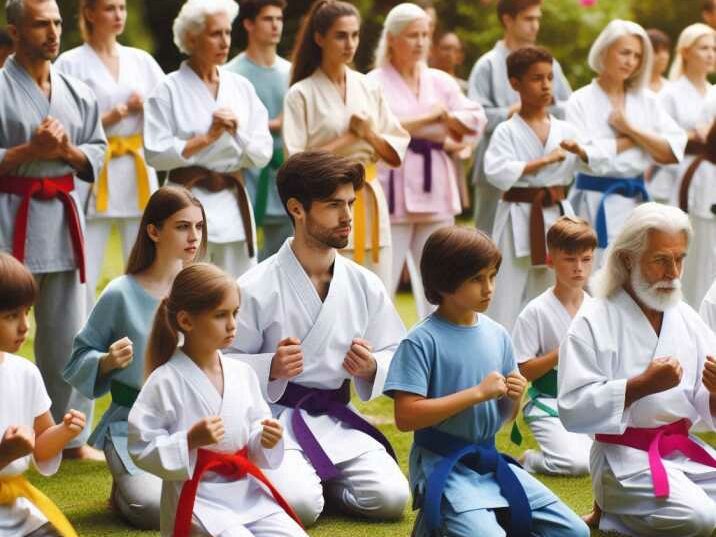Introduction
Table of Contents
Martial arts provide a wealth of benefits that go beyond just learning self-defense techniques. These disciplines can significantly enhance physical, mental, and emotional development in children. Age-specific programs in martial arts ensure that each child receives training that is appropriate for their developmental stage, maximizing the benefits they receive from their practice. Whether you are considering martial arts for your toddler, young child, pre-teen, or teenager, there is a program designed to meet their unique needs and abilities.
In this comprehensive guide, we will explore the specifics of age-specific martial arts programs, highlighting the benefits and recommended styles for each age group: toddlers (3-5 years), young kids (6-9 years), pre-teens (10-12 years), and teenagers (13+ years).

Age-Specific Martial Arts Programs: Martial Arts for Toddlers (3-5 years)
Why Martial Arts for Toddlers?
Introducing martial arts to toddlers is a fantastic way to start developing essential motor skills and coordination at an early age. At this tender age, children are highly receptive to learning new information and skills. Martial arts programs for toddlers focus on basic movements and fun activities that promote physical development and social skills. These programs are carefully designed to keep toddlers engaged while teaching them valuable lessons in a playful environment.
Benefits for Toddlers
- Improved Coordination: Martial arts involve a variety of movements that enhance balance and coordination, crucial for toddlers who are just mastering these skills.
- Discipline and Focus: Even simple exercises in martial arts teach toddlers the importance of following instructions and concentrating on tasks.
- Social Interaction: Classes provide an opportunity for toddlers to interact with their peers, building social skills and friendships.
- Fun and Enjoyment: The activities are designed to be enjoyable, ensuring that toddlers have a positive experience that encourages a lifelong interest in physical activity.
Recommended Styles
For toddlers, the most suitable martial arts styles are those that incorporate a lot of movement and fun, such as Taekwondo, Karate, and Judo. These styles often use playful drills and games to keep toddlers engaged while teaching fundamental skills.
Martial Arts for Toddlers: A Closer Look
Taekwondo for Toddlers
Taekwondo is an excellent choice for toddlers because it emphasizes kicking techniques, which are easier for young children to master. The classes are usually structured in a way that toddlers can learn through play, using basic kicking and punching drills that improve their balance and coordination. Taekwondo also introduces them to the concepts of discipline and respect.
Karate for Toddlers
Karate classes for toddlers focus on basic stances, punches, and kicks. The repetitive nature of these movements helps in developing muscle memory and motor skills. Karate also emphasizes respect for instructors and peers, helping toddlers understand the importance of manners and discipline.
Judo for Toddlers
Judo is a great martial art for toddlers because it involves a lot of rolling and falling, which can be very fun for young children. These movements help toddlers develop body awareness and coordination. Judo also teaches important principles such as respect, discipline, and perseverance in a way that is accessible to young minds.
Age-Specific Martial Arts Programs: Martial Arts for Young Kids (6-9 years)
The Next Level: Martial Arts for Young Kids
As children grow older, their ability to understand and follow more complex instructions improves. Martial arts programs for young kids are designed to build on the foundational skills learned in the toddler years and introduce more structured techniques and concepts. These programs focus on developing not only physical skills but also mental and emotional growth.
Benefits for Young Kids
- Enhanced Focus and Concentration: Martial arts training requires attention to detail and focus, which helps in academic performance as well.
- Respect and Discipline: Learning to respect instructors and peers is a crucial part of martial arts training, fostering a respectful attitude in daily life.
- Physical Fitness: Regular practice promotes overall fitness, strength, flexibility, and endurance, contributing to a healthy lifestyle.
- Confidence and Self-Esteem: Successfully learning and mastering techniques boosts self-confidence and encourages a positive self-image.
Recommended Styles
Karate, Jiu-Jitsu, and Taekwondo are excellent choices for this age group. These styles emphasize discipline, respect, and basic self-defense techniques, providing a balanced approach to physical and mental development.
Martial Arts for Young Kids: A Closer Look
Karate for Young Kids
Karate classes for young kids focus on developing basic techniques, forms (katas), and sparring skills. These classes also emphasize the importance of respect and discipline, helping children understand and appreciate the values of martial arts. The structured environment of karate classes helps children develop self-control and focus, which can translate to better behavior and performance in school.
Jiu-Jitsu for Young Kids
Jiu-Jitsu is an excellent choice for young kids because it teaches ground techniques, which are practical for self-defense. The grappling and submission techniques in Jiu-Jitsu help children develop strength, flexibility, and coordination. Additionally, Jiu-Jitsu classes often emphasize problem-solving and strategic thinking, which can enhance cognitive development.
Taekwondo for Young Kids
Taekwondo classes for young kids focus on high-energy kicks, forms (poomsae), and sparring. The emphasis on kicking techniques helps develop lower body strength and flexibility. Taekwondo also incorporates breaking techniques, where kids can break boards with their hands or feet, providing a sense of accomplishment and boosting their confidence.
Age-Specific Martial Arts Programs: Martial Arts for Pre-Teens (10-12 years)
Bridging Childhood and Adolescence: Martial Arts for Pre-Teens
Pre-teens are at a stage where they seek independence and identity. Martial arts programs for this age group focus on building self-confidence, discipline, and perseverance. These programs often incorporate more advanced techniques and concepts, preparing pre-teens for the challenges of adolescence.
Benefits for Pre-Teens
- Self-Confidence: Mastering martial arts techniques boosts self-esteem and confidence, which is particularly important during the pre-teen years.
- Discipline and Perseverance: The rigorous training instills a strong sense of discipline and the value of hard work, helping pre-teens stay focused and committed to their goals.
- Healthy Outlet for Energy: Martial arts provide a positive outlet for the physical and emotional energy of pre-teens, promoting mental and emotional well-being.
- Peer Interaction and Teamwork: Classes offer opportunities for pre-teens to interact with peers, develop teamwork skills, and build lasting friendships.
Recommended Styles
Karate, Judo, and Kung Fu are highly recommended for pre-teens. These styles not only teach self-defense but also promote mental toughness and emotional resilience, essential traits for this age group.
Martial Arts for Pre-Teens: A Closer Look
Karate for Pre-Teens
Karate classes for pre-teens focus on advanced techniques, forms, and sparring. These classes often introduce pre-teens to competition, where they can test their skills in a controlled environment. The emphasis on respect and discipline continues to be a core part of the training, helping pre-teens navigate the challenges of growing up with a strong moral foundation.
Judo for Pre-Teens
Judo is an excellent martial art for pre-teens because it emphasizes throws, holds, and ground techniques. The physical nature of Judo helps pre-teens build strength, endurance, and flexibility. Additionally, Judo teaches important life skills such as resilience, perseverance, and respect for others.
Kung Fu for Pre-Teens
Kung Fu is a traditional Chinese martial art that combines physical and mental training. For pre-teens, Kung Fu offers a diverse range of techniques, including strikes, kicks, and weapon forms. The practice of Kung Fu helps improve physical fitness, coordination, and mental focus. The philosophical teachings of Kung Fu also instill values of humility, respect, and discipline.
Age-Specific Martial Arts Programs: Martial Arts for Teenagers (13+ years)
Preparing for Adulthood: Martial Arts for Teenagers
Teenagers face a myriad of challenges, from academic pressures to social dynamics. Martial arts programs can play a pivotal role in helping them navigate this complex period. Programs for teenagers focus on advanced techniques, self-defense, leadership, and mental strength.
Benefits for Teenagers
- Self-Defense Skills: Learning how to protect themselves boosts confidence and safety, an important aspect of teenage life.
- Leadership and Responsibility: Many programs offer opportunities for teens to take on leadership roles, fostering responsibility and accountability.
- Mental and Emotional Strength: Martial arts training helps in developing resilience, stress management skills, and coping strategies for anxiety.
- Physical Fitness and Health: Regular practice helps teenagers stay physically fit, reducing the risk of obesity and promoting a healthy lifestyle.
Recommended Styles
For teenagers, Mixed Martial Arts (MMA), Muay Thai, and Jiu-Jitsu are ideal. These styles offer comprehensive training in both stand-up and ground techniques, providing a well-rounded martial arts education.
Martial Arts for Teenagers: A Closer Look
Mixed Martial Arts (MMA) for Teenagers
MMA is a popular choice for teenagers because it combines techniques from various martial arts, including striking, grappling, and submission holds. MMA training improves overall fitness, strength, and endurance. It also teaches practical self-defense skills that are applicable in real-life situations. The competitive nature of MMA can help teenagers develop a strong sense of discipline, determination, and sportsmanship.

Muay Thai for Teenagers
Muay Thai, also known as Thai boxing, is a striking art that uses punches, kicks, elbows, and knees. For teenagers, Muay Thai offers an intense workout that improves cardiovascular health, strength, and flexibility. The rigorous training helps teenagers build mental toughness and resilience. Muay Thai also emphasizes respect and humility, teaching important life values.
Jiu-Jitsu for Teenagers
Jiu-Jitsu focuses on grappling and ground fighting techniques. It is an excellent martial art for teenagers because it teaches leverage and technique over brute strength, making it effective for self-defense. Jiu-Jitsu training enhances physical fitness, coordination, and problem-solving skills. The close-knit community in Jiu-Jitsu gyms provides a supportive environment for teenagers to grow and develop.
Table of Information about Age-Specific Martial Arts Programs
| Age Group | Key Benefits | Recommended Martial Arts Styles |
|---|---|---|
| Toddlers (3-5) | Coordination, discipline, fun | Taekwondo, Karate, Judo |
| Young Kids (6-9) | Focus, respect, physical fitness | Karate, Jiu-Jitsu, Taekwondo |
| Pre-Teens (10-12) | Self-confidence, discipline, perseverance | Karate, Judo, Kung Fu |
| Teenagers (13+) | Self-defense, leadership, mental strength | Mixed Martial Arts (MMA), Muay Thai, Jiu-Jitsu |
Conclusion
In conclusion, age-specific martial arts programs offer tailored training that maximizes the benefits for children of all ages. From toddlers to teenagers, these programs promote physical fitness, mental resilience, and character development. By choosing the right martial arts style for your child’s age group, you can provide them with valuable life skills while ensuring they have fun and stay active throughout their journey in martial arts.
FAQs
1. What is the best age to start martial arts?
The best age to start martial arts varies, but programs are available for children as young as 3 years old. Each age-specific program is designed to meet the developmental needs of the child, ensuring a positive and beneficial experience.
2. What benefits do martial arts offer to young children?
Martial arts offer numerous benefits including improved coordination, discipline, social skills, physical fitness, and confidence. These benefits can contribute to better behavior, academic performance, and overall well-being.
3. Can martial arts help with my child’s behavior?
Yes, martial arts can help improve behavior by teaching respect, discipline, focus, and self-control. These values are reinforced through consistent practice and the structured environment of martial arts classes.
4. Are there any risks associated with martial arts training for kids?
While any physical activity carries some risk, martial arts programs for kids are designed to be safe and age-appropriate. Instructors are trained to ensure that techniques are taught safely and that students are supervised closely to minimize injuries.
5. How do I choose the right martial arts school for my child?
Look for a school with qualified instructors, age-specific programs, a focus on safety, and a positive, supportive environment. Visiting the school, observing classes, and speaking with instructors and other parents can help you make an informed decision.


